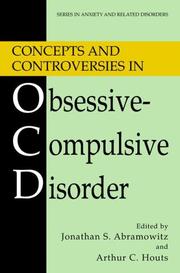| Listing 1 - 10 of 18 | << page >> |
Sort by
|

ISBN: 128070084X 9786610700844 0387233709 038723280X 1441920080 Year: 2005 Publisher: New York, N.Y. ; [London] : Springer,
Abstract | Keywords | Export | Availability | Bookmark
 Loading...
Loading...Choose an application
- Reference Manager
- EndNote
- RefWorks (Direct export to RefWorks)
Few syndromes in psychopathology generate as much popular curiosity and clinical exploration as does obsessive-compulsive disorder (OCD). Since the 1970s, research on OCD has increased exponentially. Speci?c advances include an improved grasp of the heterogeneity of the disorder, identi?cation of putative subtyping schemes, and the development of increasingly sophisticated theoretical models of the etiology and maintenance. Perhaps most importantly, research has led to advances in treatment; andwhereasthe?rstlinetherapies(cognitive-behaviortherapyandserotonergicm- ication) are not entirely effective for every sufferer, they have transformed OCD from an unmanageable lifetime af?iction into a treatable problem that need not reduce quality of life. Despite the aforementioned advances, there have emerged a number of sharp disagreements concerning OCD. Differences have surfaced over phenomenological issues, etiological models, and approaches to treatment, and often occur (but not exclusively) along disciplinary lines between biologically oriented and cogniti- behaviorally oriented authorities. For example, medical approaches posit that abn- mal biological processes cause OCD, whereas psychosocial formulations emphasize the role of learning and dysfunctional cognitions. Yet because theoretical conjecture andempirical?ndingsfromwithineachtraditionaretypicallyaddressedtowardd- tinct and narrow audiences, clinicians, researchers, and students with broad interests are hindered from gaining a clear grasp of the diverse (and sometimes polarized) perspectives.
Obsessive-compulsive disorder. --- Compulsive behavior. --- Addictive behavior --- Behavior, Compulsive --- Compulsion (Psychology) --- Impulse --- Psychology, Pathological --- Obsessive-compulsive disorder --- Compulsive disorder --- Fixed ideas --- Obsession (Psychology) --- Obsessive-compulsive neuroses --- Obsessive-compulsive neurosis --- OCD (Disease) --- Neuroses --- Compulsive behavior --- Psychology, clinical. --- Consciousness. --- Clinical Psychology. --- Personality and Social Psychology. --- Clinical psychology. --- Apperception --- Mind and body --- Perception --- Philosophy --- Psychology --- Spirit --- Self --- Psychiatry --- Psychology, Applied --- Psychological tests --- Personality. --- Social psychology. --- Mass psychology --- Psychology, Social --- Human ecology --- Social groups --- Sociology --- Personal identity --- Personality psychology --- Personality theory --- Personality traits --- Personology --- Traits, Personality --- Individuality --- Persons --- Temperament

ISBN: 1281227234 0080550495 0080447015 9780080550497 9780080447018 9781281227232 Year: 2008 Publisher: Amsterdam Boston Elsevier
Abstract | Keywords | Export | Availability | Bookmark
 Loading...
Loading...Choose an application
- Reference Manager
- EndNote
- RefWorks (Direct export to RefWorks)
Researchers and clinicians working with Obsessive-Compulsive Disorders (OCD) and related disorders who need the most current information available will find this volume of great use. This work covers contemporary theory, research, and treatment of the various subtypes of OCD and problems often referred to as OCD spectrum disorders. As the mental health field considers the next iteration of the DSM, an entire research agenda is being planned to elucidate issues such as how best to understand and classify OCD. The questions of subtypes and spectrum disorders are at the heart of this is
Obsessive-compulsive disorder. --- Compulsive disorder --- Fixed ideas --- Obsession (Psychology) --- Obsessive-compulsive neuroses --- Obsessive-compulsive neurosis --- OCD (Disease) --- Neuroses --- Compulsive behavior
Digital
ISBN: 9780387233703 Year: 2005 Publisher: Boston, MA Springer Science+Business Media, Inc
Abstract | Keywords | Export | Availability | Bookmark
 Loading...
Loading...Choose an application
- Reference Manager
- EndNote
- RefWorks (Direct export to RefWorks)
Social psychology --- Psychiatry --- klinische psychologie --- persoonlijkheidsleer

ISBN: 9780080550497 0080550495 9780080447018 0080447015 1281227234 9781281227232 Year: 2008 Publisher: Boston Elsevier
Abstract | Keywords | Export | Availability | Bookmark
 Loading...
Loading...Choose an application
- Reference Manager
- EndNote
- RefWorks (Direct export to RefWorks)
Researchers and clinicians working with Obsessive-Compulsive Disorders (OCD) and related disorders who need the most current information available will find this volume of great use. This work covers contemporary theory, research, and treatment of the various subtypes of OCD and problems often referred to as OCD spectrum disorders. As the mental health field considers the next iteration of the DSM, an entire research agenda is being planned to elucidate issues such as how best to understand and classify OCD. The questions of subtypes and spectrum disorders are at the heart of this issue and will guide how OCD is conceptualized in DSM-V. This volume, dedicated to such diagnostic, theoretical, and treatment issues, helps informs the field of the most up-to-date knowledge and what remains to be resolved. * Deconstructs OCD into its subtypes * Reviews current research and treatment for these problems * Considers how OCD will be conceptualized in DSM-V * Represents an international scope with contributions from field experts in psychology, psychiatry, and social work * Includes critical discussion of the OCD subtype and OCD spectrum concepts.
Book
ISBN: 9780889374119 Year: 2015 Publisher: Boston : Hogrefe,
Abstract | Keywords | Export | Availability | Bookmark
 Loading...
Loading...Choose an application
- Reference Manager
- EndNote
- RefWorks (Direct export to RefWorks)
Book
ISBN: 9781433830655 Year: 2020 Publisher: Washington, DC : American Psychological Association,
Abstract | Keywords | Export | Availability | Bookmark
 Loading...
Loading...Choose an application
- Reference Manager
- EndNote
- RefWorks (Direct export to RefWorks)
Anxiety --- Anxiety disorders --- Anxiété --- Physiological aspects. --- Treatment. --- Aspect physiologique. --- Thérapeutique.

ISBN: 0889373167 Year: 2005 Publisher: Cambridge Göttingen : Hogrefe,
Abstract | Keywords | Export | Availability | Bookmark
 Loading...
Loading...Choose an application
- Reference Manager
- EndNote
- RefWorks (Direct export to RefWorks)
Diagnostic --- Psychothérapie --- Traitement --- Trouble obsessionnel-compulsif --- Traitement --- Trouble obsessionnel-compulsif
Book
ISBN: 1433831430 Year: 2020 Publisher: Washington, DC : American Psychological Association,
Abstract | Keywords | Export | Availability | Bookmark
 Loading...
Loading...Choose an application
- Reference Manager
- EndNote
- RefWorks (Direct export to RefWorks)
Anxiety --- Anxiety disorders --- Physiological aspects. --- Treatment.
Book
ISBN: 9780387233703 Year: 2005 Publisher: Boston, MA Springer Science+Business Media, Inc.
Abstract | Keywords | Export | Availability | Bookmark
 Loading...
Loading...Choose an application
- Reference Manager
- EndNote
- RefWorks (Direct export to RefWorks)
Few syndromes in psychopathology generate as much popular curiosity and clinical exploration as does obsessive-compulsive disorder (OCD). Since the 1970s, research on OCD has increased exponentially. Speci?c advances include an improved grasp of the heterogeneity of the disorder, identi?cation of putative subtyping schemes, and the development of increasingly sophisticated theoretical models of the etiology and maintenance. Perhaps most importantly, research has led to advances in treatment; andwhereasthe?rstlinetherapies(cognitive-behaviortherapyandserotonergicm- ication) are not entirely effective for every sufferer, they have transformed OCD from an unmanageable lifetime af?iction into a treatable problem that need not reduce quality of life. Despite the aforementioned advances, there have emerged a number of sharp disagreements concerning OCD. Differences have surfaced over phenomenological issues, etiological models, and approaches to treatment, and often occur (but not exclusively) along disciplinary lines between biologically oriented and cogniti- behaviorally oriented authorities. For example, medical approaches posit that abn- mal biological processes cause OCD, whereas psychosocial formulations emphasize the role of learning and dysfunctional cognitions. Yet because theoretical conjecture andempirical?ndingsfromwithineachtraditionaretypicallyaddressedtowardd- tinct and narrow audiences, clinicians, researchers, and students with broad interests are hindered from gaining a clear grasp of the diverse (and sometimes polarized) perspectives.
Social psychology --- Psychiatry --- klinische psychologie --- persoonlijkheidsleer
Book
ISBN: 1433835800 9781433835803 Year: 2022 Publisher: Washington, DC: American Psychological Association,
Abstract | Keywords | Export | Availability | Bookmark
 Loading...
Loading...Choose an application
- Reference Manager
- EndNote
- RefWorks (Direct export to RefWorks)
"This book describes training, supervision, and consultation with specialized cognitive behavior therapy (CBT) approaches, to ensure proper implementation across a variety of clinical contexts. Although CBT is sometimes portrayed as a single treatment method, the expert contributors in this volume describe a diverse collection of cognitive behavioral theories and techniques, such as exposure therapy, acceptance and commitment therapy, dialectical behavior therapy, and child behavior management. Contributors also review application guidelines for a variety of settings, including public schools, inpatient and outpatient medical settings, and diverse client populations representing different religious and spiritual beliefs, cultural and ethnic backgrounds, and sexual and gender minorities. For each approach and setting, contributors describe key concepts and techniques, explain the characteristics of good and bad training cases, survey common trainee mistakes and supervision obstacles, and also address common ethical issues. This book is intended for CBT trainees and practitioners who seek training in specialized areas, and those trained in other theoretical orientations who seek to adapt CBT techniques to their practice. "-- "This book describes training, supervision, and consultation with specialized cognitive behavior therapy approaches to ensure proper implementation across diverse settings and populations"--
| Listing 1 - 10 of 18 | << page >> |
Sort by
|

 Search
Search Feedback
Feedback About UniCat
About UniCat  Help
Help News
News